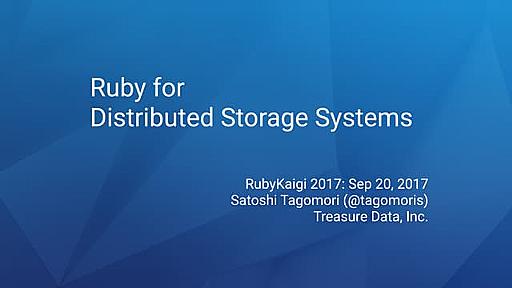ゆううきが開発しているlstfやtranstracerなどのツールを最近のObservabilityの流れから紹介した話です。 Kyoto.なんか #5, https://kyoto-nanka.connpass.com/event/141982/, 2019年8月24日.


↓↓↓↓訂正あります。↓↓↓↓ 2018/07/02に株式会社エフコード社内で行われた勉強会のスライドです。 訂正版(随時更新中): https://docs.google.com/presentation/d/15HOMfAbtdWwO48njcB8IdkN3kVAMu3wsmZo0O3S-f_4/edit?usp=sharing 専門家による資料・専門家向けの資料ではありません。自分自身で学習し、論文・文献等を読解してまとめた内容となります。間違い等あるかもしれませんが、あれば是非コメント頂ければと思います。 【訂正事項】 スライド16: 誤:たった一つのプロセスが故障しただけでも有限時間で合意できない 正:たった一つのプロセスが故障しうるだけでも有限時間で合意できない スライド20: 誤: 重要: あるschedule σ1, σ2 がdisjoint (nodeが被ってない) なら

2. 2Copyright©2017 NTT corp. All Rights Reserved. 諸説あるが、ここでの定義は「部分的な故障を許容するシステム」の事 複数台のコンピュータを接続して信頼性を高めたり データが途中で化けても再送したり訂正したり 一部のコンピュータが突然故障しても引き継いだり 故障を設計の一部に組み込む事が必須となる 分散システムとは 3. 3Copyright©2017 NTT corp. All Rights Reserved. • 世はまさに分散システム戦国時代 • Hadoopを皮切りに次々出てくる巨大分散OSS • シリコンバレーでも分散ミドルウェアベンチャーが多数出現 • 高信頼なシステムを作ろうと思った場合には複数台のマシンによる高可用構成 が前提になる • Google、Facebook、Amazon等はもちろん • 金融、流通などのエンタープラ

This document discusses using Ruby for distributed storage systems. It describes components like Bigdam, which is Treasure Data's new data ingestion pipeline. Bigdam uses microservices and a distributed key-value store called Bigdam-pool to buffer data. The document discusses designing and testing Bigdam using mocking, interfaces, and integration tests in Ruby. It also explores porting Bigdam-pool

This document summarizes Plazma, Treasure Data's distributed analytical database that can import 40 billion records per day. It discusses how Plazma reliably imports and processes large volumes of data through its scalable architecture with real-time and archive storage. Data is imported using Fluentd and processed using its column-oriented, schema-on-read design to enable fast queries. The docume

4. 素朴な実装 3 frequency = defaultdict(int) for line in opened_file: for word in some_splitter(line): frequency[word] += 1 for word in frequency: some_output(word, frequency[word]) ファイル frequency メモリに 辞書/ハッシュ/ 連想配列/Mapを 持つ頻度(Pythonic) frequency = collections.Counter( word for line in opened_file for word in some_splitter(line)) for word, count in frequency.iteritems(): some_output(word, count)

This document discusses Presto, an open source distributed SQL query engine for interactive analysis of large datasets. It describes Presto's architecture including its coordinator, connectors, workers and storage plugins. Presto allows querying of multiple data sources simultaneously through its connector plugins for systems like Hive, Cassandra, PostgreSQL and others. Queries are executed in a p

リリース、障害情報などのサービスのお知らせ
最新の人気エントリーの配信
処理を実行中です
j次のブックマーク
k前のブックマーク
lあとで読む
eコメント一覧を開く
oページを開く